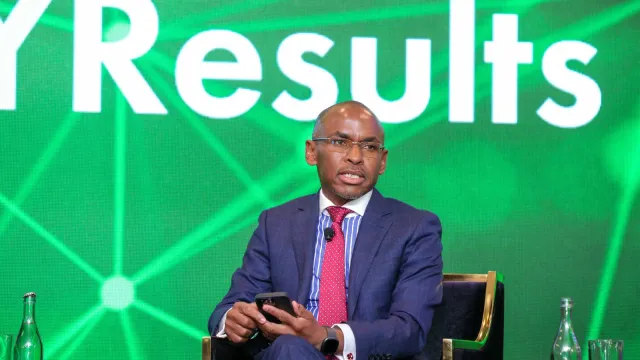Safaricom turns to the internet as profits drop

Safaricom turns to the internet as profits drop
Safaricom wants to be the biggest internet provider in the country to diversify from its slowing voice, message and mobile money business, by targeting one million connections of homes and business and backing the government project to link schools and hospitals to fiber infrastructure.
The telco currently has 250,000 homes linked to their fiber network, 205 fifth generation (5G) sites in 23 counties and has now placed a bid in the governments procurement of laying over 100,000 kilometers of fibre optic cables across Kenya and establishment of digital village smart hubs and studios in each of the country’s 1450 wards.
The telco boss Peter Ndegwa said the company wants to accelerate new businesses as the company’s main revenue lines dip, slowing down revenue growth.
“The government wants to build fiber connection across the country and we are going to be part of that work of connecting schools and hospitals,” Mr Ndegwa said during the release of the company financials.
Safaricom profits have dipped for the third year in a row on increased cost of funding the new Ethiopian business, and new state taxes that have escalated the fall in voice revenues and a slowdown in Mpesa revenues.
The giant telco reported a net profit of Kes52.4 billion for the full year ending March, a 22.4 percent drop from Kes67.4 billion last year.
“The review of the Mobile Termination Rates and introduction of additional taxes on SIM cards and mobile phones has also led to a slow down momentum in the industry. We continue engaging with regulators to find mutually beneficial solutions for all stakeholders,” Mr Ndegwa said.
The new taxes especially hit Safaricom mobile handset sales that dropped to Kes11.4 billion a 20.1 percent decline from Kes14.3 billion.
Voice income which has seen longtime decline on use of free online application and more affordable messaging options, fell 2.6 percent to kes81 billion while mobile revenue took a 17.7 hit to Kes8.1 billion from Kes9.8 billion.
M-pesa revenues that had gone up 30 percent last year to Kes107.6 billion now only edged up 8.8 percent to Kes117.1 billion, the only revenue stream that made over a hundred billion for the company making it the dominant engine of growth.
The mobile money platform now controls 39.7 per cent of Safaricom’s business a significant risk for the telco given the recurrent push by authorities to split M-Pesa from the business even as voice dropped to just 27.4 percent of Safaricom earnings.
This has informed Safaricom’s great push towards internet provision and geographical expansion into Ethiopia where the telco has also received a regulatory approval to launch a mobile money business.
Mobile data’s Kes53.9 billion now accounts for 18.2 percent of the business after growing by a percentage point and fixed enterprise grew to 2.9 per cent of the business while FTTH grew to 1.7 percent of the telco revenues.



